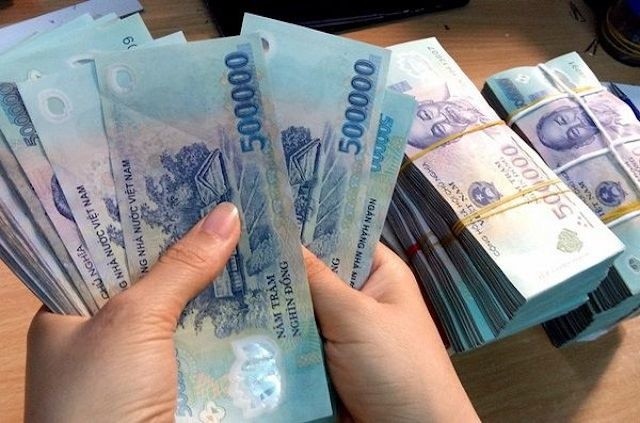 |
| Tax, fee, and charge exemption, reduction, and extension worth approximately 200 trillion VND |
Develop different policies to support businesses and individuals
Following previous fiscal policies on tax, fee, and charges exemption, and remission, the MoF has actively implemented the assigned tasks, proposed, developed, and submitted competent authorities to issue and expedite the implementation of fiscal policies, together with monetary policy and other macro policies, to remove difficulties for businesses and individuals over the last six months.
Fiscal policies have helped to stabilize the macroeconomy, control inflation, maintain large economic balances, promote growth, ensure social security, and improve people's lives.
There are a series of policies to support individuals and businesses that have been implemented over the past time. For example, The MoF requested that the Government submit to the National Assembly for promulgation Resolution 101/2023/QH15 dated June 24, 2023, on lowering the value-added tax rate by 2% (10% down 8%) to stimulate consumer demand, effective from July 1, 2023, to December 31, 2023. This policy is expected to reduce the State budget revenue in the last 6 months by about 20 trillion VND and in January 2024 by about 4 trillion VND.
Furthermore, the Government submitted to the National Assembly Standing Committee for promulgation Resolution No. 30/2022/UBTVQH15 dated December 30, 2022, on the environmental protection tax rate for gasoline, oil, and lubricants, effective from January 1, 2023, to December 31, 2023. This policy is predicted to reduce State budget revenue by approximately 38 trillion VND in 2023; it is not included in the State budget revenue estimate for 2023.
The MoF has continued to submit to the Government and the Prime Minister for promulgation Decree No. 12/2023/ND-CP dated April 14, 2023, on the extension of value-added tax, corporate income tax, personal income tax, and land rent in 2023 (the estimated reduction of the State budget revenue during the extension period is approximately 110 trillion VND). In addition, Decree No. 36/2023/ND-CP of June 21, 2023, extends the deadline for payment of excise tax on domestically produced and assembled cars (State budget revenues during the extension period are anticipated to decline by approximately 10.4 - 11.2 trillion VND).
The Government issued Decree No. 41/2023/ND-CP dated June 28, 2023, regulating the registration fee for cars, trailers, or semi-trailers pulled by cars, and similar vehicles that are domestically produced and assembled (State budget revenue in 2023 is estimated to decrease by approximately 8 - 9 trillion VND).
Moreover, plenty of other policies were issued, including Decree No. 44/2023/ND-CP dated June 30, 2023, regulating the policy of value-added tax remission under National Assembly Resolution No. 101/2023/QH15 dated June 24, 2023; Decision No. 01/2023/QD-TTg dated January 31, 2023, on reducing land and water surface rents of 2022 for subjects affected by the Covid-19 pandemic; the decrease will be offset against the payable amount in 2023 (the estimates for 2023 State budget reduction is approximately 3.5 billion VND).
The MoF issued Circular No. 44/2023/TT-BTC dated June 29, 2023, regulating the reduction of 36 types of fees and charges to support businesses and individuals (it is expected to reduce State budget revenue by about VND 700 billion).
According to the MoF’s calculations, the scale of the exemption, reduction, and extension of taxes, fees, charges, and land rents issued in 2023 is worth approximately 200 trillion VND (VND 79 trillion for exemption, reduction; 121 trillion VND for extension).
Effective implementation of issued support solutions
The economic situation remained difficult in the first months of 2023. In the light of having unfavorable impacts on State budget revenue over the past few years (i.e., under pressure from the decline in production and business of enterprises and citizens while reducing revenue due to the implementation of support solutions), while still ensuring the demand for State budget expenditure for regular activities, ensuring capital for development investment, and especially increasing the demand for spending on social security, disease prevention, and health care; State budget balance has encountered significant challenges.
However, the MoF has always been determined to accompany and work shoulder-to-shoulder with businesses and individuals through support solutions to help them overcome difficulties and quickly restore and develop production and business activities. As a result, production and business activities will contribute back to the economy and the State budget and also nurture stable and long-term revenue sources.
In reality, solutions to support businesses and individuals in the form of taxes, fees, charges, and land rents that are urgently built, issued, and implemented are considered timely, have a positive impact, and are responded to and highly appreciated by the business community and citizens; thereby contributing to the recent results in the recovery and development of businesses, individuals, and the economy over the past few years.
The forecast of the global economic situation in the last 6 months of 2023 suggests being continually complicated and unpredictable. Along with the drastic and effective implementation of the issued support tasks and measures, the MoF continues to closely monitor the actual situation to study and propose appropriate solutions.
Simultaneously, the MoF continues to study and advise competent authorities to complete the system of tax policies outlined in the Party's resolutions and the National Assembly's resolutions.
Furthermore, the MoF keeps on reforming all aspects of work, such as perfecting institutions, improving the effectiveness and efficiency of the apparatus, and reforming administrative procedures in a more comprehensive and effective direction. At the same time, the finance sector continues to accelerate the modernization of fields in the sector, especially in the fields of tax and customs, which are thought to be highly and directly related to businesses and individuals.
The aforementioned policies aim to make it easier and less expensive for individuals and businesses to improve the business environment, thereby contributing to increasing national competitiveness./.





















































